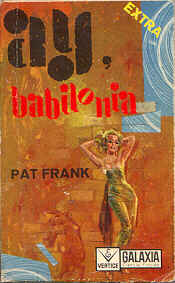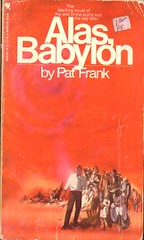
Alas, Babylon (1959) by Pat Frank
Here I continue my exploration of the post-apocalyptic sub-genre of science fiction. This American novel takes place at some unspecified time at the height of the US/Soviet Cold War. It posits that the Soviet Union acts upon the concept of the missile gap to exert a first strike option on the US. The ensuing holocaust destroys or makes uninhabitable vast swaths of the country and indeed, the world.
The novel, however, trains it's eye on the small scale issues that occur in a small town in Florida, Fort Repose. The hero, Randy Bragg, is a young lawyer whose brother is high in the military intelligence world. He recieves a tipoff and must house his brothers family because of the heightened geopolitical tensions. After the bombs fall, Bragg's home serves as a nexus of hope and survival for the small surrounding community as they try to forge a new society out of the ashes of the old one.
This is an interesting and important book for the genre. Compared to a another PA novel (Earth Abides) reviewed here that was written 10 years earlier the tone is much more fearful and yet strongly competent. The author doesn't question whether a codified society will survive; he wants to assure us that it will take a firm hand to guide us there. Randy Bragg's post-apocalyptic survival tasks include protecting the chickens from wolves, bringing highwaymen to justice and obtaining supplies for the community.
Social issues crop up but the expectation is for the status quo: women will remain in the kitchen although slightly more competently and with the ability to come up with a few more good ideas. The negros close knowledge of the land is an asset but integration ultimately stops with the childern being allowed to school together.
Alas, Babylon is dated but it is of it's time. The Cold War was an all too real threat and when the Soviets launched Sputnik 1 in 1957 there was a strong belief that war was inevitable. This novel gives the Ameican perspective of how many felt about a possible conflagration and how the survivors would (and should) react.


No comments:
Post a Comment